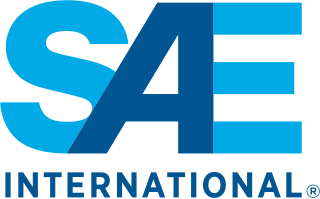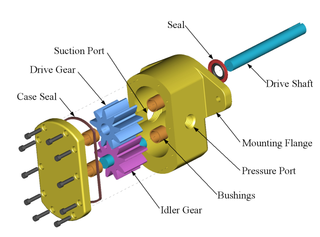
Horsepower (hp) is a unit of measurement of power, or the rate at which work is done, usually in reference to the output of engines or motors. There are many different standards and types of horsepower. Two common definitions used today are the mechanical horsepower, which is about 745.7 watts and the metric horsepower, which is approximately 735.5 watts.
A lubricant is a substance that helps to reduce friction between surfaces in mutual contact, which ultimately reduces the heat generated when the surfaces move. It may also have the function of transmitting forces, transporting foreign particles, or heating or cooling the surfaces. The property of reducing friction is known as lubricity.

Motor oil, engine oil, or engine lubricant is any one of various substances that consist of base oils enhanced with various additives, particularly antiwear additives, detergents, dispersants, and, for multi-grade oils, viscosity index improvers. Motor oil is used for lubrication of internal combustion engines. The main function of motor oil is to reduce friction and wear on moving parts and to clean the engine from sludge and varnish (detergents). It also neutralizes acids that originate from fuel and from oxidation of the lubricant (detergents), improves sealing of piston rings, and cools the engine by carrying heat away from moving parts.

SAE International, previously known as the Society of Automotive Engineers, is a U.S.-based, globally active professional association and standards developing organization for engineering professionals in various industries. SAE International World Headquarters is in Warrendale, Pennsylvania, located 20 miles north of Pittsburgh, Pennsylvania. Principal emphasis is placed on global transport industries such as aerospace, automotive, and commercial vehicles. Accordingly, the name SAE International was established to reflect the broader emphasis on mobility.

Synthetic oil is a lubricant consisting of chemical compounds that are artificially made. Synthetic lubricants can be manufactured using chemically modified petroleum components rather than whole crude oil, but can also be synthesized from other raw materials. The base material, however, is still overwhelmingly crude oil that is distilled and then modified physically and chemically. The actual synthesis process and composition of additives is generally a commercial trade secret and will vary among producers.
The National Lubricating Grease Institute is an international trade association that serves the grease and gear lubricant industry. It exists to promote research and development of lubrication technology. It also publishes industry standards for greases.
The NLGI consistency number expresses a measure of the relative hardness of a grease used for lubrication, as specified by the standard classification of lubricating grease established by the National Lubricating Grease Institute (NLGI). Reproduced in standards ASTM D4950(“standard classification and specification of automotive service greases”) and SAE J310(“automotive lubricating greases”), NLGI's classification is widely used. The NLGI consistency number is also a component of the code specified in standard ISO 6743-9“lubricants, industrial oils and related products — classification — part 9: family X (greases)”.

Gear oil is a lubricant made specifically for transmissions, transfer cases, and differentials in automobiles, trucks, and other machinery. It is of a high viscosity and usually contains organosulfur compounds. Some modern automatic transaxles do not use a heavy oil at all but lubricate with the lower viscosity hydraulic fluid, which is available at pressure within the automatic transmission. Gear oils account for about 20% of the lubricant market.
Brake fluid is a type of hydraulic fluid used in hydraulic brake and hydraulic clutch applications in automobiles, motorcycles, light trucks, and some bicycles. It is used to transfer force into pressure, and to amplify braking force. It works because liquids are not appreciably compressible.

A gear pump uses the meshing of gears to pump fluid by displacement. They are one of the most common types of pumps for hydraulic fluid power applications. The gear pump was invented around 1600 by Johannes Kepler.
The viscosity index (VI) is an arbitrary, unit-less measure of a fluid's change in viscosity relative to temperature change. It is mostly used to characterize the viscosity-temperature behavior of lubricating oils. The lower the VI, the more the viscosity is affected by changes in temperature. The higher the VI, the more stable the viscosity remains over temperature fluctuations. The VI was originally measured on a scale from 0 to 100; however, advancements in lubrication science have led to the development of oils with much higher VIs.
Grease is a solid or semisolid lubricant formed as a dispersion of thickening agents in a liquid lubricant. Grease generally consists of a soap emulsified with mineral or vegetable oil.

DEXRON is the trade name for a group of technical specifications of automatic transmission fluid (ATF) created by General Motors (GM). The name is a registered trademark of GM, which licenses the name and specifications to companies which manufacture the fluid and sell it under their own brand names. Not all Dexron fluids are licensed for reselling under another brand name. All licensed Dexron fluids must have a license number that begins with the letters B through J. If no license number or "Dexron Approved" logo is found on the container, the fluid may not be GM approved and the fluid cannot be guaranteed to meet GM specifications. GM, like many automobile manufacturers, uses transmissions sourced from other suppliers or transmission manufacturers around the world; these transmissions are not manufactured by GM. Many of these automatic transmissions use unique fluids that might not be shown on this page.
The cold-cranking simulator (CCS) is a device used to determine the low temperature performance of lubricants, when starting a cold engine. In this condition, the only energy available to turn the engine comes from the starter motor and the battery, and it has been widely assumed that the system acts as a constant power viscometer. The use of this device for this purpose is standardized as ASTM D5293.
Society of Automotive Engineers standard SAE J1587 is an automotive diagnostic protocol standard developed by the Society of Automotive Engineers (SAE) for heavy-duty and most medium-duty vehicles built after 1985. The J1587 protocol uses different diagnostic connectors. Up to 1995, individual OEMs used their own connectors. From 1996 to 2001, the 6-pin Deutsch-connector was standard. Beginning in 2001, most OEMs converted to the 9-pin Deutsch. Some OEMs still use the 6-pin Deutsch. It has mostly been used for US made vehicles, and also by Volvo. Other European brands have usually used KWP.
Shell Rotella T is a line of heavy duty engine lubrication products produced by Royal Dutch Shell. The line includes engine oils, gear oils and coolants. The oil carries both the American Petroleum Institute (API) diesel "C" rating as well as the API gasoline engine "S" rating. Ratings differ based on the oil. Rotella oils like T3 15w-40 meets both the API CJ-4 and SM specifications, and may be used in both gasoline and diesel engines. However, it is formulated specifically for vehicles without catalytic converters, containing phosphorus levels beyond the 600-800ppm range. Therefore, Rotella is not recommended for gasoline vehicles with catalytic converters due to the higher risk of damaging these emission controls. Newer formulations of Rotella T6 however are API SM rated as safe for pre-2011 gasoline vehicles.
Reginald James Seymour Pigott was a British/American mechanical and consulting engineer, director of the engineering division of Gulf Research & Development Company, a subsidiary of Gulf Oil, and inventor.
The mini-rotary viscometer is a device used to measure the pumpability of an engine oil at low temperatures. Engine oils must meet viscometric standards including those determined by the MRV in order to be classifiable within SAE J300 viscosity grades. The requirement was added after the winters of 1980-81 and 1981-82 caused major pumpability field problems in the US and Europe.
SAE J300 is a standard that defines the viscometric properties of mono- and multigrade engine oils, maintained by SAE International. Key parameters for engine oil viscometrics are the oil's kinematic viscosity, its high temperature-high shear viscosity measured by the tapered bearing simulator, and low temperature properties measured by the cold-cranking simulator and mini-rotary viscometer. This standard is commonly used throughout the world, and standards organizations that do so include API and ILSAC, and ACEA.






